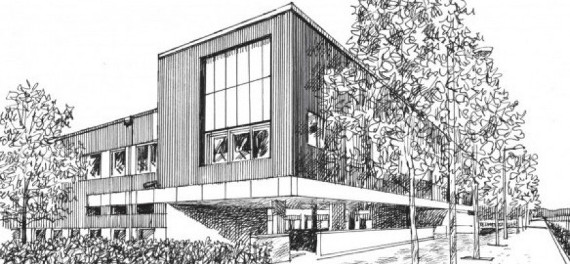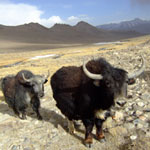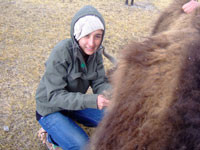Yak Yak - promise of a better future for people of the Pamirs

|
Yaks in Tajikstan
Sarah Ong |
Yak down (fine hair) is set to revitalise the economy of one of the world’s most remote regions thanks to efforts from a Cambridge University engineering graduate.
The 'Yak Yak' Project has been set up by NGO Operation Mercy, with the help of Sarah Ong, who recently completed a degree in manufacturing engineering. The project is intended to generate income from fine yak hair for the inhabitants of the Pamir mountain range in Tajikistan. Little industry exists in the area, which covers almost half of Tajikistan, but the mountain range is home to a sizeable yak population. Although the animals have been herded there for centuries, their down has generally been discarded. Its potential as a source of income was first identified by Operation Mercy Tajikistan and Sarah worked throughout the spring with their team to decide how best to put it to use.
The end product is yet to be finalised, but progress has been made on trialling hand tufting of the down, collecting spun samples, and knitting prototype hats and scarves. The fineness of the down lends itself to knitwear and Yak Yak is planning to target high street consumers.
"We decided on producing finished goods to maximise the employment potential for the locals," Sarah said. "The biggest problem is to separate the down from the hair - along with improving quality, we also need to establish reliable production if we want to export garments overseas."
Sarah now plans to return for another two years, to follow up on her initial work by testing the reliability and quality of production and beginning the search for partner organisations. She said: "I didn't want to work at a regular factory in the UK and central Asia gave me the chance to use my skills where they will make a big difference. It was wonderful to be able to apply university knowledge in somewhere so completely different". "My stay there has changed my perspective on life. From these people, I have learnt the difference between a luxury and necessity. Earlier I would think that taking a shower is a necessity, now I think it's a luxury. "I also believe that the West can learn a lot from them because eventually we are all going to face a resource crunch. They know how to live with fewer resources, and not out of choice but because they are forced to."
Funding for Sarah's initial project was provided by a bursary from Engineers Without Borders UK, an NGO dedicated to funding projects that help human development through engineering, and the Royal Academy of Engineering. The early stages and ongoing work have been funded by other sources.











